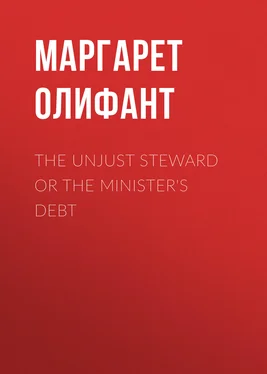Маргарет Олифант - The Unjust Steward or The Minister's Debt
Здесь есть возможность читать онлайн «Маргарет Олифант - The Unjust Steward or The Minister's Debt» — ознакомительный отрывок электронной книги совершенно бесплатно, а после прочтения отрывка купить полную версию. В некоторых случаях можно слушать аудио, скачать через торрент в формате fb2 и присутствует краткое содержание. Издательство: Иностранный паблик, Жанр: foreign_prose, literature_19, foreign_antique, на английском языке. Описание произведения, (предисловие) а так же отзывы посетителей доступны на портале библиотеки ЛибКат.
- Название:The Unjust Steward or The Minister's Debt
- Автор:
- Издательство:Иностранный паблик
- Жанр:
- Год:неизвестен
- ISBN:нет данных
- Рейтинг книги:3 / 5. Голосов: 1
-
Избранное:Добавить в избранное
- Отзывы:
-
Ваша оценка:
- 60
- 1
- 2
- 3
- 4
- 5
The Unjust Steward or The Minister's Debt: краткое содержание, описание и аннотация
Предлагаем к чтению аннотацию, описание, краткое содержание или предисловие (зависит от того, что написал сам автор книги «The Unjust Steward or The Minister's Debt»). Если вы не нашли необходимую информацию о книге — напишите в комментариях, мы постараемся отыскать её.
The Unjust Steward or The Minister's Debt — читать онлайн ознакомительный отрывок
Ниже представлен текст книги, разбитый по страницам. Система сохранения места последней прочитанной страницы, позволяет с удобством читать онлайн бесплатно книгу «The Unjust Steward or The Minister's Debt», без необходимости каждый раз заново искать на чём Вы остановились. Поставьте закладку, и сможете в любой момент перейти на страницу, на которой закончили чтение.
Интервал:
Закладка:
“There is no necessity for that,” Mr. Buchanan said.
“No, no necessity, but it might be safer; so that he might wait for you if he should have any temptation otherwise, or business to take him out.”
“If he has business, he will see to it whether he knows I am coming or not,” said the minister; “and if I do not see him this morning, I can see him another day.”
“Oh, Claude, my man, don’t put off another day! It will have to be done sooner or later. Do not keep it hanging over you day after day.”
“Well, then,” said the minister, with some crossness of tone, “for goodsake, if you are so urgent, go away and let me get up. How can I get myself dressed with you there?”
Mrs. Buchanan disappeared without another word. And he had no further excuse for putting off. Even the wife of his bosom, though she knew it would be a bad moment, did not know half how bad it was. Mrs. Buchanan had made up her mind to it, however it might turn out. She had already planned out how the expenses were to be lessened after Marion’s marriage. Elsie was the only other girl, and she was but fourteen. Several years must elapse before it was necessary to bring her out, and give her that share in the pleasures and advantages of youthful life which was her due. And between that time and this there was no privation that the good mother was not ready to undertake in order to pay off this debt. You would have thought to see their frugal living that to spare much from it was impossible, but the minister’s wife had already made her plans, and her cheerfulness was restored. It might take them a long time to do it, but Mr. Anderson’s heir was only seventeen, and had still a good many years of his minority to run. And Willie by that time would have a good salary, and would be able to help. It would be a case of sparing every sixpence, but still that was a thing that could be done. What a good thing that education was so cheap in St. Rule. John, who was going to be a clergyman, like his father, would have all his training at home in the most economical way. And Alick was to go to Mr. Beaton’s, the writer, as soon as he had completed his schooling, without any premium. They might both be able to help if the worst came to the worst, but between her own economies and Willie’s help, who had the best right to help, seeing it was greatly on his account the money had been borrowed, she had little doubt that in four years they would manage to repay, at least, the greater part of the three hundred pounds.
This was all straightforward, but the minister’s part was not so straightforward. He read over the parable again before he went down-stairs, and made up his mind finally to take his bill and write fifty. After all, was not this what Mr. Anderson would have desired? He was an old man and took no particular interest in his heir. He would not, of course, have left his money away from him, or injured him in any way. He quite recognised his claim through his father, a cousin whom the old man had never known, but who still was his next of kin; yet, on the other hand, if it came to that, Mr. Anderson was more fully interested in the young Buchanans. He had seen them all grow up, and Willie and Marion had been a great deal more to him than young Frank Mowbray. And Mr. Buchanan was his friend. The minister was persuaded that old Mr. Anderson would far rather have pardoned him the debt than extorted it from him almost at the risk of his life. “Take thy bill, and sit down quickly, and write fifty.” The words of the parable seemed more and more reasonable, more and more adapted to his own case as he read them over and over. What he was about to do seemed to him, at the end, the very right thing to do and the command of heaven.
Mrs. Buchanan met him in the hall with his hat brushed to a nicety, and his gloves laid out upon the table. She came up to him with a brush in her hand, to see if there was the faintest speck upon his broadcloth. She was his valet, and a most cheerful and assiduous one, loving the office. She liked to turn him out spotless, and to watch him sally forth with delight and pride in his appearance, which never failed her. It was one of the ways of the women of her day, and a pretty one, I think. She was pleased with his looks, as he stood in the hall ready to go out.
“But why are you so pale?” she said; “it is not an affair of life and death. I hope you are not feared for Mr. Morrison.”
“I am feared for everybody,” said Mr. Buchanan, “that has to do with money.”
“Oh, Claude,” she said, “I just hate the filthy lucre myself, but it’s not a question of life or death. The bairns are all well and doing well, and will pay it off before Frank Mowbray comes of age. I promise you we will. I have it all in my eye. Do not, my dear man, do not look so cast down.”
He shook his head but made no answer. He was not thinking of what she said. He was saying over to himself, “Sit down quickly, and take thy bill, and write fourscore.”
CHAPTER IV.
TAKE NOW THY BILL AND WRITE FIFTY
Mr. Buchanan went first to the bank, and drew out the money—the residue of the loan which had been placed there for Marion’s final equipment. In those days people did not use cheques, as we do now for every purpose. When a man paid a debt, it seemed far more sure and satisfactory to pay it in actual money. To all, except to business men, the other seemed a doubtful, unsatisfactory way, and those who received a cheque made great haste to cash it as if in the meantime the bank might break, or the debtor’s balance turn the wrong way. To pay with a simple bit of paper did not seem like paying at all. Mr. Buchanan received his fifty pounds in crisp new notes, pretty notes printed in blue and red. They were like a little parcel of pictures, all clean and new. He looked at them with a forlorn admiration: it was seldom he saw such a thing as a ten-pound note: and here were five of them. Ah, if that had been all! “Sit down quickly and write fourscore.” This variant troubled his mind a little in his confusion! But that was measures of wheat, he said to himself, with a distracted sense that this might somehow make a difference. And then he walked up the High Street in the morning sunshine to Mr. Morrison’s office; and sure enough the writer was there and very glad to see him, so that no chance of escape remained.
“I have come to speak to you,” the minister said, clearing his throat, and beginning with so much difficulty—he that would read you off an hour’s sermon without even pausing for a word!—“about business, Morrison—about a little—monetary transaction there was—between me and our late—most worthy friend–”
“Anderson?” said the writer. And then he added with a half laugh, tempered by the fact that “the death” had been so recent. “Half St. Rule’s, I’m thinking, have had monetary transactions with our late friend–”
“He would not permit any memorandum of it to be made,” said the minister.
“No: that was just like him: only his estate will be the worse for it; for we can’t expect everybody to be so frank in acknowledging as you.”
Mr. Buchanan turned the colour of clay, his heart seemed to stop beating. He said: “I need not tell you—for you have a family of your own—that now and then there are expenses that arise.”
The lawyer waved his hand with the freemasonry of common experience. “Well I know that,” he said; “it is no joke nowadays putting the laddies out in the world. You will find out that with Willie—but what a fine opening for him! I wish we were all as well off.”
“Yes, it is a good opening”—if it had not been that all the joy and the pride in it was quenched by this!—“and that is precisely what I mean, Morrison. It was just Willie—ordinary expenses, of course, my wife and I calculate upon and do our best for—but an outfit–”
Читать дальшеИнтервал:
Закладка:
Похожие книги на «The Unjust Steward or The Minister's Debt»
Представляем Вашему вниманию похожие книги на «The Unjust Steward or The Minister's Debt» списком для выбора. Мы отобрали схожую по названию и смыслу литературу в надежде предоставить читателям больше вариантов отыскать новые, интересные, ещё непрочитанные произведения.
Обсуждение, отзывы о книге «The Unjust Steward or The Minister's Debt» и просто собственные мнения читателей. Оставьте ваши комментарии, напишите, что Вы думаете о произведении, его смысле или главных героях. Укажите что конкретно понравилось, а что нет, и почему Вы так считаете.












